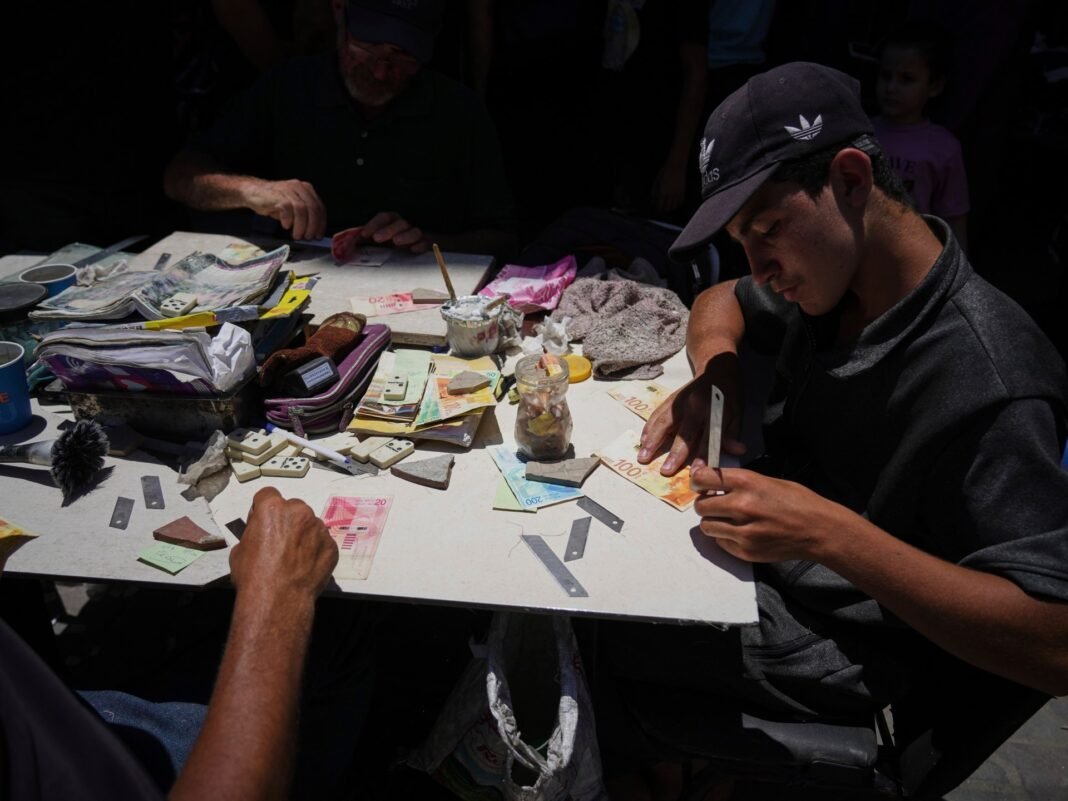The Breakdown of Currency and Trade in Gaza
When Money Becomes ineffective
Picture trying to buy a kilogram of flour in Gaza today. You pull out a battered 10-shekel note from your wallet, its edges torn and patched with tape.Onc valued at about $3, this bill used to be the cornerstone of daily purchases but now holds almost no worth-vendors refuse it, and buyers hesitate to use it.
This deterioration is not limited to small bills; even larger denominations like 100-shekel notes are losing their utility. When paying for an 80-shekel item with such a note, shopkeepers frequently enough cannot provide change as the remaining cash is too damaged or scarce to circulate.
The Physical Decline of Cash: A Symptom of Economic Collapse
In response, makeshift stalls have appeared across markets dedicated solely to repairing torn or taped banknotes-a desperate effort to keep commerce functioning amid the currency’s physical decay.Yet this visible damage only scratches the surface of Gaza’s deeper financial paralysis.
A Frozen Financial infrastructure
Government employees have gone months without paychecks while NGOs face immense hurdles transferring salaries. Families struggle as remittance channels dry up; the once-functioning financial systems supporting Gaza have all but vanished with no clear path toward restoration.
Political restrictions and closed banking networks trap money inside Gaza’s borders, choking cash flow until economic activity nearly grinds to a halt.
The Prohibitive Expense of Accessing funds
If residents receive money from relatives abroad-in places like Ramallah or Egypt-the fees are crippling.For every 1,000 shekels sent (roughly $300), recipients might only see half after exorbitant charges levied by informal intermediaries operating outside official banking frameworks.
Banks such as bank of Palestine and Cairo Amman Bank remain shuttered with dusty windows; inside lie empty halls devoid of working ATMs or any customer services.
Brokers supplant Banks Amid Black Market Networks
With banks inactive, brokers linked at times with black market operations step in-facilitating cash withdrawals but demanding steep commissions that turn simple transactions into costly ordeals resembling exploitation disguised as business. Despite these conditions, many depend on these brokers out of sheer necessity.
The Digital Payment Dilemma: Technology Falls Short
Even those holding bank cards face constant challenges: frequent power outages disable payment terminals; unreliable internet connections hinder electronic transactions; point-of-sale devices are rare or broken down entirely. Presenting a card at checkout often results in rejection rather then acceptance.
Some resort to showing printed screenshots displaying account balances they cannot access electronically or carry expired bank documents hoping for trust-but these attempts rarely secure purchases successfully.
A Limited Role for Digital Wallets?
A small number accept digital wallets; however, infrastructural weaknesses mean both users and merchants remain few-making digital payments largely impractical throughout most Gazan markets today.
The Resurgence of Barter Systems: Trading Without Money
As currency loses its function as an exchange medium, people revert centuries back by bartering goods directly:
- A man swaps cooking oil for sugar;
- lentils trade hands for rice;
- An old jacket exchanges for vegetables;
This informal economy thrives on fluctuating values where prices become guesses shaped more by scarcity-induced emotions than stable market forces-and everything remains negotiable daily depending on supply shortages rather than predictable demand patterns.
“I exchanged my winter coat just so I could get diapers,” said Waleed, father of twins. “The way people looked at me made me feel humiliated-as if I was begging.”
Dignity Undermined Amid economic Siege
This situation isn’t romanticizing simpler times-it highlights how when formal economic systems collapse under pressure and money stops functioning properly-the human toll extends beyond finances into personal dignity itself. Dreams fade away when survival consumes all energy; planning becomes impossible when every day feels like an emergency struggle.
“I sold my gold bracelet meant only for emergencies,” shared Saeid Lina from her tent home near Mine Street neighborhood. “Now every single day feels like one long emergency.”
An Economy Strangled by Siege Tactics
This devastation was neither accidental nor solely due to internal mismanagement. The occupation has deliberately blocked not just goods but also inflows of currency , weaponizing liquidity against Gaza’s population by dismantling its entire banking system.
This economic strangulation forms part of a broader siege strategy aimed not merely through violence but through denying essential resources needed for life-such as food staples, water supplies, medicine-and ultimately hope itself.
If This Trajectory Persists…
- Salaries will disappear completely;
- No official marketplaces will survive;
- Barely functional barter networks will erode until even personal trades become impossible due to lack of tradable goods;
This path risks turning Gaza into one of the first modern urban societies forced entirely back onto barter economies-a regression unseen anywhere else globally-and threatens basic social concepts such as fairness and trust within communities alongside monetary collapse if urgent interventions fail.
(End)



